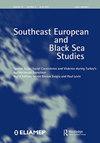Critical readings of Turkey’s foreign policy
IF 0.8
2区 社会学
Q2 AREA STUDIES
引用次数: 3
Abstract
connectedness of military relations with the political, economic, societal, and other layers of regional and wider security regimes that intersect in this region’ (page 129) not being given the attention they deserve. This section raises questions about the future of regional relations, whose stability and improvement are a must for the stability of the region. In the last section of the volume, the authors take on the international level, discussing approaches to delivering and maintaining peace and security in the Western Balkans by two main actors involved since the 1990s, that is EU and US, as well as those powers that have for the past decade and a half or so become active players in the region, this being Russia, China, Gulf States, Turkey, and Iran. The authors discuss not only the manner of the Western engagement herein, but they additionally show how in recent years, non-Western actors have come to challenge the notion of the Western Balkans being the ‘Western powers’ playground’, indicating the democracy-wise often corrosive influence of the latter actors. This section is brought to a close with a chapter, and I fully agree with the authors on the conclusions herein, showing that the status quo in the Western Balkans is here to stay, whereby the said scenario is deemed as ‘the most probable’ (page 284), indicating that most likely no significant changes in the region will happen in the next several years. Although perhaps not a very happy ending to the volume, it is a very realistic one. I am positive that this volume will be welcomed by both students and lecturers, as well as policy practitioners and makers interested in acquiring security-related information on the Western Balkans. The book is, therefore, a valuable contribution to the study of the given region, highlighting not only the main security challenges that exist herein but also those matters that require further academic treatment.对土耳其外交政策的批判性解读
军事关系与该地区交叉的政治、经济、社会和其他层面的地区和更广泛的安全制度的联系”(第129页)没有得到应有的关注。本节提出了有关区域关系未来的问题,区域关系的稳定和改善是该区域稳定的必要条件。在本卷的最后一节中,作者从国际层面讨论了自20世纪90年代以来,欧盟和美国这两个主要参与者,以及在过去十五年左右成为该地区积极参与者的大国,即俄罗斯、中国、海湾国家、土耳其、,以及伊朗。作者不仅讨论了西方参与的方式,还展示了近年来,非西方行为者如何挑战西巴尔干地区是“西方大国游乐场”的概念,这表明后一行为者在民主方面往往具有腐蚀性的影响。本节以一章结束,我完全同意作者在本文中的结论,表明西巴尔干地区的现状将持续下去,因此上述情况被认为是“最有可能的”(第284页),表明该地区在未来几年内很可能不会发生重大变化。虽然这本书的结局可能不是很幸福,但它是一个非常现实的结局。我确信,这本书将受到学生和讲师以及有兴趣获取西巴尔干安全相关信息的政策从业者和决策者的欢迎。因此,这本书对特定地区的研究做出了宝贵贡献,不仅突出了这里存在的主要安全挑战,还突出了需要进一步学术处理的问题。
本文章由计算机程序翻译,如有差异,请以英文原文为准。
求助全文
约1分钟内获得全文
求助全文
来源期刊

Southeast European and Black Sea Studies
AREA STUDIES-
CiteScore
3.00
自引率
19.00%
发文量
73
期刊介绍:
The aim of the journal is to establish a line of communication with these regions of Europe. Previously isolated from the European mainstream, the Balkan and Black Sea regions are in need of serious comparative study as are the individual countries, no longer "at the edge" of Europe. The principal disciplines covered by the journal are politics, political economy, international relations and modern history; other disciplinary approaches are accepted as appropriate. The journal will take both an academic and also a more practical policy-oriented approach and hopes to compensate for the serious information deficit on the countries under consideration.
 求助内容:
求助内容: 应助结果提醒方式:
应助结果提醒方式:


